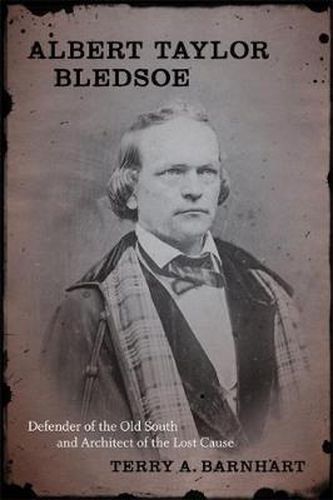Readings Newsletter
Become a Readings Member to make your shopping experience even easier.
Sign in or sign up for free!
You’re not far away from qualifying for FREE standard shipping within Australia
You’ve qualified for FREE standard shipping within Australia
The cart is loading…






Albert Taylor Bledsoe (1809-1877), a principal architect of the South’s
Lost Cause
mythology, remains one of the Civil War generation’s most controversial intellectuals. In Albert Taylor Bledsoe: Defender of the Old South and Architect of the Lost Cause, Terry A. Barnhart sheds new light on this provocative figure.
Bledsoe gained a respectable reputation in the 1840s and 1850s as a metaphysician and speculative theologian. His two major works, An Examination of President Edwards’ Inquiry into the Freedom of the Will (1845) and A Theodicy; Or, Vindication of the Divine Glory, As Manifested in the Constitution and Government of the Moral World (1853), grapple with perplexing problems connected with causality, Christian theology, and moral philosophy. His fervent defense of slavery and the constitutional right of secession, however, solidified Bledsoe as one of the chief proponents of the idea of the Old South. In An Essay on Liberty and Slavery (1856), he assailed egalitarianism and promoted the institution of slavery as a positive good. A decade later, he continued to devote himself to fashioning the
Lost Cause
narrative as the editor and proprietor of the Southern Review from 1867 until his death in 1877. He carried on a literary tradition aimed to reconcile white southerners to what he and they viewed as the indignity of their defeat by sanctifying their lost cause. Those who fought for the Confederacy, he argued, were not traitors but honorable men who sacrificed for noble reasons.
This biography skillfully weaves Bledsoe’s extraordinary life history into a narrative that illustrates the events that shaped his opinions and influenced his writings. Barnhart demonstrates how Bledsoe still speaks directly, and sometimes eloquently, to the core issues that divided the nation in the 1860s and continue to haunt it today.
$9.00 standard shipping within Australia
FREE standard shipping within Australia for orders over $100.00
Express & International shipping calculated at checkout
Albert Taylor Bledsoe (1809-1877), a principal architect of the South’s
Lost Cause
mythology, remains one of the Civil War generation’s most controversial intellectuals. In Albert Taylor Bledsoe: Defender of the Old South and Architect of the Lost Cause, Terry A. Barnhart sheds new light on this provocative figure.
Bledsoe gained a respectable reputation in the 1840s and 1850s as a metaphysician and speculative theologian. His two major works, An Examination of President Edwards’ Inquiry into the Freedom of the Will (1845) and A Theodicy; Or, Vindication of the Divine Glory, As Manifested in the Constitution and Government of the Moral World (1853), grapple with perplexing problems connected with causality, Christian theology, and moral philosophy. His fervent defense of slavery and the constitutional right of secession, however, solidified Bledsoe as one of the chief proponents of the idea of the Old South. In An Essay on Liberty and Slavery (1856), he assailed egalitarianism and promoted the institution of slavery as a positive good. A decade later, he continued to devote himself to fashioning the
Lost Cause
narrative as the editor and proprietor of the Southern Review from 1867 until his death in 1877. He carried on a literary tradition aimed to reconcile white southerners to what he and they viewed as the indignity of their defeat by sanctifying their lost cause. Those who fought for the Confederacy, he argued, were not traitors but honorable men who sacrificed for noble reasons.
This biography skillfully weaves Bledsoe’s extraordinary life history into a narrative that illustrates the events that shaped his opinions and influenced his writings. Barnhart demonstrates how Bledsoe still speaks directly, and sometimes eloquently, to the core issues that divided the nation in the 1860s and continue to haunt it today.